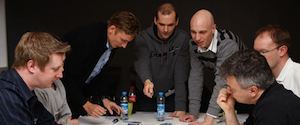GOTO is a vendor independent international software development conference with more that 90 top speaker and 1300 attendees. The conference cover topics such as .Net, Java, Open Source, Agile, Architecture and Design, Web, Cloud, New Languages and Processes
Open Space
When: 23. May 2011 at 18:00 -
Abstract
Open Space for GOTO Amsterdam
We invite you to be part of the steering of GOTO Amsterdam (13th - 15th October, 2011)
Date 23rd May, 2011
Time 18:00 / 6PM
Venue @JTeam's Offices
Address Rijnsburgstraat 9-11, 1059 AT Amsterdam
Costs Free of charge
Our Goals
- Listening to your ideas
- Getting you involved
- Creating awareness of GOTO Amsterdam
Program
"Open Space Technology (OST) is an approach for hosting meetings, conferences, corporate-style retreats and community summit events, focused on a specific and important purpose or task—but beginning without any formal agenda, beyond the overall purpose or theme.
Self-Organization
Highly scalable and adaptable, OST has been used in meetings of 5 to 2,100 people. The approach is characterized by five basic mechanisms:
- a broad, open invitation that articulates the purpose of the meeting;
- participant chairs arranged in a circle;
- a "bulletin board" of issues and opportunities posted by participants;
- a "marketplace" with many breakout spaces that participants move freely between, learning and contributing as they "shop" for information and ideas;
- a "breathing" or "pulsation" pattern of flow, between plenary and small-group breakout sessions.
The approach is most distinctive for its initial lack of an agenda, which sets the stage for the meeting's participants to create the agenda for themselves, in the first 30–90 minutes of the meeting or event. Typically, an Open Space meeting will begin with short introductions by the sponsor (the official or acknowledged leader of the group) and usually a single facilitator. The sponsor introduces the purpose; the facilitator explains the "self-organizing" process called "Open Space." Then the group creates the working agenda, as individuals post their issues in bulletin board style. Each individual "convener" of a breakout session takes responsibility for naming the issue, posting it on the bulletin board, assigning it a space and time to meet, and then later, showing up at that space and time, kicking off the conversation, and taking notes. These notes are usually compiled into a proceedings document that is distributed physically or electronically to all participants. Sometimes one or more additional approaches are used to sort through the notes, assign priorities and identify what actions should be taken next. Throughout the process, the ideal facilitator is described as being "fully present and totally invisible" (see Owen, User's Guide), "holding a space" for participants to self-organize, rather than managing or directing the conversations."
Source: Wikipedia.Org
We're sorry, registration is closed
